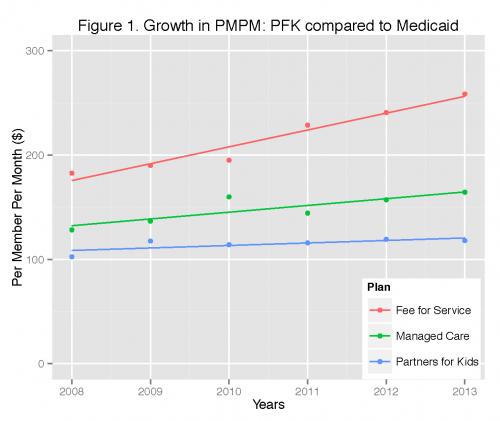In Pediatrics, Kelly Kelleher and colleagues report results from an evaluation of a pediatric Accountable Care Organization(I am an author and the primary data analyst).
BACKGROUND AND OBJECTIVES: Accountable care organizations (ACOs) are responsible for costs and quality across a defined population. To succeed, the ACO must improve value by reducing costs while either maintaining or improving the quality of care. We examined changes from 2008 through 2013 in the cost and quality of care for Partners for Kids (PFK), a pediatric ACO serving an Ohio Medicaid population.
Important disclosure: We — the authors — worked either for PFK or Nationwide Children’s Hospital of Columbus, OH, which founded PFK.
METHODS: We measured the historical cost of care for PFK and gathered comparison statewide Ohio Medicaid fee-for-service (FFS) and managed care (MC) cost histories. Changes in quality of care measures were assessed by using 15 Agency for Healthcare Research and Quality Pediatric Quality Indicators and 4 indicators targeted by PFK.
RESULTS: PFK per-member-per-month costs were lower in 2008 than either FFS or MC (P < .001) costs and grew at a rate of $2.40 per year compared with FFS increases of $16.15 per year (P < .001) and MC increases of $6.47 per year (P = .121) with ∼3.5 million member- months each year.
PFK was able to reduce the rate of increase in health care costs relative to either FFS or MC Medicaid systems. Here’s a graph showing the cost results.

Moreover, PFK did it without compromising the overall quality of care.
The quality of care of children in PFK improved significantly (P < .05) in 2011–2013 versus 2008–2010 on 5 quality measures (including 2 composite measures) and declined significantly on 3 measures. Other measures did not change or were rare events with no measureable change.
So we increased the value Ohio got for its Medicaid dollar. In that sense, the ACO worked.
Of course, we had hoped that the quality of care delivered by PFK providers would have increased substantially across a broad range of measures. That quality of care improved modestly but not dramatically improved is consistent with the experience of adult ACOs. The challenge before us is to continue to hold the line on costs, while accelerating improvement in quality.

